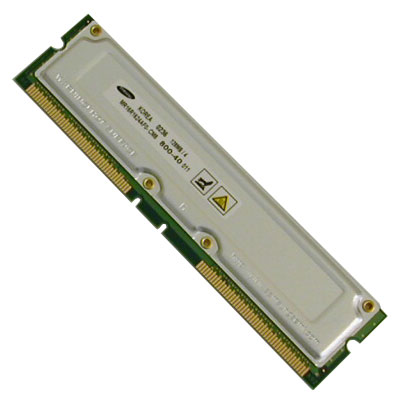Rambus Loses 7-year Patent Battle Against Micron, Hynix
Rambus suffered a painful loss in court against Micron and Hynix.
Rambus filed an antitrust lawsuit against several DRAM manufacturers back in 2004, alleging that the companies colluded against Rambus to shoot down the company's RDRAM memory technology.
Back in the late 1990s, RDRAM was the memory technology favored by Intel for its Pentium III and 4 processors. Intel heavily promoted RDRAM and even invested $300 million in Samsung's memory manufacturing to ramp up RDRAM production and bring manufacturing prices of the technology down. However, few memory manufacturers supported RDRAM due to no demand and high production prices that were substantially higher than the PC133 and PC266 modules.
Rambus accused memory manufacturers of price fixing to prevent a success of RDRAM, but a jury now determined that Rambus did not "meet its burden of proving its case against the two defendants." Micron saw it a bit differently and said that the jury simply cleared the company of "any and all liability" as the company "acted in accordance with the law and consistent with its values of innovation and fair competition in the marketplace."
It was a big blow for Rambus that wiped hopes for a $4 billion judgment in favor of Rambus; investors reacted in a panic. Rambus stock dropped from about $18.50 to $4.63 in the hours following the announcement. Shares recovered slightly and have been trading at about $8.75 on Thursday, but the judgment still wiped about $900 million from Rambus' market cap.
Get Tom's Hardware's best news and in-depth reviews, straight to your inbox.

Wolfgang Gruener is an experienced professional in digital strategy and content, specializing in web strategy, content architecture, user experience, and applying AI in content operations within the insurtech industry. His previous roles include Director, Digital Strategy and Content Experience at American Eagle, Managing Editor at TG Daily, and contributing to publications like Tom's Guide and Tom's Hardware.
-
iam2thecrowe and amd are using this for their new vid cards............ AMD is making a lot of bad moves lately.Reply -
opmopadop Let that be a lesson for anyone out there that wants to release a memory module that performs ever so slightly better than the competition for 3 times the price.Reply -
iam2thecrowe moose caboosepatent trolling Rambus loses? about time.hopefully we will see some corrective action for the biggest patent troll, Apple.Reply -
tacoslave iam2thecroweand amd are using this for their new vid cards............ AMD is making a lot of bad moves lately.If the 7970 is priced about the same at launch (~$400) then i wouldn't call it a bad move as supposedly this type of memory increases bandwidth by 50% over gddr5 and consumes 30% less power. So if these things hold true we might see rambus coming back into relevence in the memory sector.Reply -
sykozis Exactly what Pentium3 compatible motherboards supported RDRAM??? The only boards I've ever seen support it were all for Pentium4 processors....Reply
iam2thecroweand amd are using this for their new vid cards............ AMD is making a lot of bad moves lately.Rumors say AMD is using XDR....not RDRAM.... -
shqtth RDRAM was crazy price. And the ram companies did nothing to lower costs. the technology was not a prioity compared to other technoligies. Due to the high price, intel was forced to move to PC133/DDR.Reply
So I can see why RAMBUS would be pissed.
THere is no reason RDRAM was so expensive to buy. RAM companies just didn't give a crap and didn't care to manufacture enough to reduce costs. If you think about it, they had Itel pushing the technology. ANd if Intel cannot push the technology then you know something is wrong.
They had a good opportunity, and wind was taken from their sails.
RAMBUS turned evil after this. -
shqtth It wouldn't of been bad if RDRAM took off when it did, then prices for faster DDR would of been cheaper. I remember DDR being limited to 400, and there was special grade OCZ stuff. Well if RDAM took off, I am sure ram would of been DDR500/DDR600, and DDR2 would of been pushed faster. It was not until DDR3 that ram speeds starting to go crazy, meanwhile crappy ram at slower speeds was still being pushed. RAM speeds did need a kick in the ass back thenReply -
felix666 Do the oldest ones remember Cirrus Logic doing graphics chips? They were hot back in 1994. At about the same time as Intel and the P3, they released a new line of graphics chips with integrated 3D processor, using Rambus ram instead of the then-hot EDO ram. The chip was a total flop, nothing close to the projected performance expectations. Single-pixel ops were not efficient. Too much latency. They made a version of this same graphics chip but using SDRAM. It worked much better, but it was too late, their oem customers had moved to other chip manufacturers. Cirrus Logic nearly died.Reply
